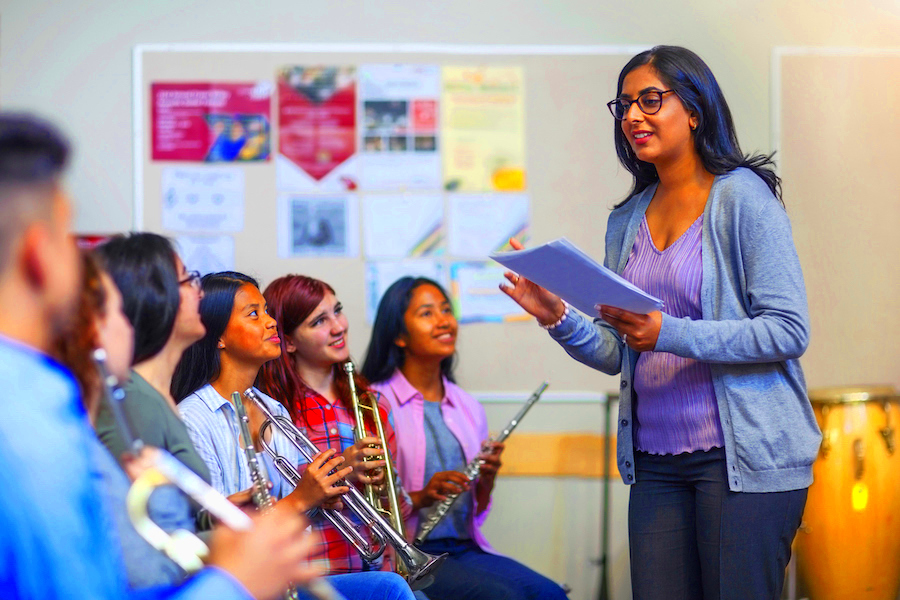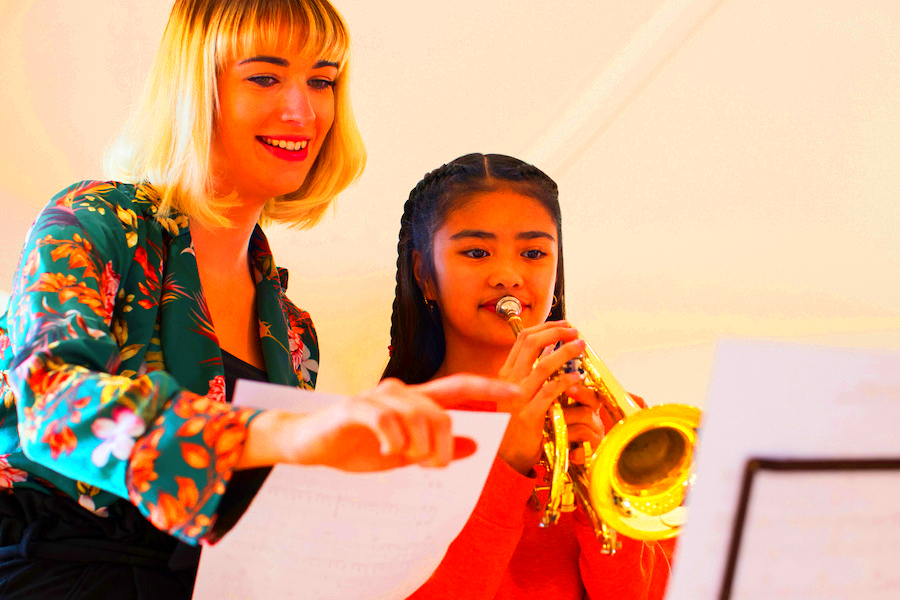No need to worry whether or not you going to make it through each day as a freelance music teacher, just make sure you love music for all of its complexities and idiosyncrasies. The love for music and student development is what makes a music teacher. Freelance music teachers are self-employed instructors who teach private lessons that are customized to meet their student’s specific needs through online or face-to-face session. Therefore, you can create your own timetable, select your favorite teaching methods and work with students of various stages in their musical journey including amateurs as well as professionals.
The following are a few significant duties that you need to know as a freelance music instructor:
- Teaching Skills: You’ll need to teach students how to play instruments, read music, and understand musical theory.
- Creating Lesson Plans: Each student may require a unique approach, so you’ll develop lesson plans that fit their goals.
- Providing Feedback: Giving constructive criticism is essential for student growth.
- Encouraging Creativity: Inspire your students to express themselves through music.
Your most important job is to help your students develop a passion for music while at the same time giving them everything they’ll need to be good at playing theirs.
Identifying Your Target Audience as a Music Teacher

For effective teaching, it is essential to know who your students are. Your potential audience can be:
- Beginners: These are students who have little to no experience with music.
- Intermediate Students: Individuals looking to improve their skills and knowledge.
- Advanced Students: Musicians seeking specialized instruction.
- Age Groups: Consider if you want to work with children, teenagers, or adults.
Identify the audience you want and then you can adjust your teaching style to fit into their demands. For instance, beginners may require a more organised method while advanced learners might demand a technique and performance focus. Also knowledge of the audience is important in selling services effectively.
Also Read This: What is a Package in Fiverr?
Creating an Engaging Teaching Curriculum

Effective teaching hinges on designing a curriculum that provides opportunities for students to be actively involved. Steps in creating such an engaging curriculum include:
- Assess Student Levels: Start by evaluating each student’s skill level to personalize their learning experience.
- Set Clear Goals: Define what you want your students to achieve in each lesson and over time.
- Incorporate Various Learning Materials: Use books, online resources, and videos to provide diverse learning experiences.
- Include Practical Exercises: Ensure that students practice what they learn through exercises and performance opportunities.
- Encourage Feedback: Regularly ask for student input on what they enjoy and what they find challenging.
To illustrate, a syllabus for novices in playing guitar could contain:
Setting Your Rates for Music Lessons
Deciding how much to charge for your music lessons can feel tricky, but it’s essential to ensure you’re fairly compensated for your time and expertise. Rates can vary based on several factors, including your experience, location, and the type of lessons you offer. Here’s how to determine the right pricing structure for your services.
Start by researching what other music teachers in your area charge. This will give you a baseline to work from. Consider these key factors when setting your rates:
- Experience Level: If you have years of experience or specialized training, you can justify higher rates.
- Lesson Length: Decide if you’ll charge by the hour or offer half-hour sessions at a lower rate.
- Student Level: Beginners may require more foundational lessons, while advanced students may be willing to pay more for specialized training.
- Location: If you’re teaching in a high-cost area or providing lessons at a studio, you might set higher rates.
Here’s a simple example of a pricing structure:
| Lesson Length | Rate for Beginners | Rate for Advanced Students |
|---|---|---|
| 30 minutes | $25 | $35 |
| 60 minutes | $40 | $60 |
Finally, don’t forget to review and adjust your rates periodically to reflect your growing experience and changes in demand.
Also Read This: What is a Live Portfolio on Fiverr?
Marketing Your Services Effectively
Marketing is crucial for attracting students to your music lessons. To effectively promote your services, think about who your ideal student is and how you can reach them. Here are some practical strategies to help you market yourself:
- Create a Professional Website: Showcase your services, qualifications, and testimonials. Make sure it’s easy for potential students to contact you.
- Leverage Social Media: Use platforms like Instagram and Facebook to share your musical journey, teaching tips, and student successes.
- Network Locally: Connect with local music schools, community centers, and libraries. Offer free workshops or performances to gain visibility.
- Utilize Online Directories: List your services on platforms where people search for music teachers.
Remember, the more visible you are, the more likely potential students will find you. A consistent online presence and community involvement can make a significant difference in attracting students.
Also Read This: How to Get Fiverr Clients: A Comprehensive Guide
Utilizing Online Platforms for Promotion
In today’s digital age, online platforms are a powerful way to promote your music teaching services. Here are several effective methods to leverage these platforms:
- Social Media Platforms: Use Facebook, Instagram, and TikTok to share videos of your lessons, music tips, and performances. Engage with your audience by responding to comments and messages.
- Online Teaching Platforms: Consider joining platforms like Zoom or Skype for virtual lessons, expanding your reach beyond local students.
- Online Marketplaces: Websites like Fiverr or Thumbtack allow you to create profiles, list your services, and connect with potential students seeking music lessons.
- Content Creation: Start a blog or YouTube channel where you share music tutorials, tips, and insights. This not only showcases your expertise but also drives traffic to your services.
Here’s a brief overview of how to get started on these platforms:
| Platform | How to Use |
|---|---|
| Post regular updates and engage with followers through stories and live sessions. | |
| YouTube | Create video lessons and tutorials to attract viewers who may want to learn from you. |
| Fiverr | Set up a gig offering online music lessons with clear pricing and description. |
By utilizing these online platforms, you can expand your reach, attract more students, and create a successful music teaching business.
Also Read This: Can I Tip on Fiverr? Understanding the Tipping Culture in Freelancing
Building a Positive Reputation and Client Base
As a freelance music teacher, your reputation is everything. A strong reputation not only attracts new students but also helps you retain current ones. So, how do you build a positive reputation and a loyal client base? It starts with providing exceptional service and fostering meaningful relationships with your students.
Here are some effective strategies to help you achieve this:
- Deliver Quality Lessons: Always come prepared, tailor lessons to each student's needs, and ensure they feel challenged but not overwhelmed.
- Encourage Feedback: Ask your students and their parents for feedback regularly. Use this information to improve your teaching methods.
- Showcase Student Progress: Celebrate your students' achievements, whether it’s a completed song or an improvement in their technique. This not only boosts their confidence but also shows potential clients what you can accomplish.
- Ask for Reviews: Request testimonials from satisfied students and parents. Display these on your website and social media pages.
- Stay Professional: Be punctual, respectful, and communicative. A professional demeanor builds trust and makes students feel valued.
By focusing on these strategies, you’ll establish a positive reputation that encourages new students to seek your lessons.
Also Read This: How to Cancel a Fiverr Request: A Step-by-Step Guide
Frequently Asked Questions About Freelance Music Teaching
When starting as a freelance music teacher, you might have questions, and so will your potential students. Addressing these FAQs can help build trust and clarify expectations. Here are some common questions:
- What qualifications do I need? While formal qualifications can help, many successful freelance music teachers rely on their experience and teaching skills.
- Do I need to offer online lessons? Offering online lessons can significantly expand your reach and attract more students.
- How long are lessons typically? Lessons usually last between 30 to 60 minutes, depending on the student’s age and skill level.
- What if a student cancels a lesson? Establish a clear cancellation policy upfront to manage expectations.
- How can I attract more students? Use effective marketing strategies, provide quality lessons, and encourage word-of-mouth referrals.
By proactively answering these questions, you help ease potential concerns and create a welcoming environment for new students.
Conclusion and Next Steps for Aspiring Music Teachers
Becoming a successful freelance music teacher is an exciting journey filled with opportunities for growth and creativity. As you navigate this path, remember the importance of quality teaching, effective marketing, and building relationships. Here are some actionable next steps to help you move forward:
- Develop Your Skills: Continue to improve your teaching skills and musical knowledge. Attend workshops or take online courses.
- Set Clear Goals: Define your short-term and long-term goals as a music teacher. This could include a target number of students or specific teaching milestones.
- Create a Teaching Schedule: Plan a weekly schedule that allows you to balance teaching and personal time effectively.
- Network with Other Musicians: Connect with other music teachers and musicians in your area for collaboration and support.
- Stay Adaptable: Be open to feedback and willing to adjust your teaching methods as needed.
With dedication and passion, you can create a fulfilling career as a freelance music teacher. Embrace the challenges and enjoy the rewarding experience of helping others discover the joy of music!




